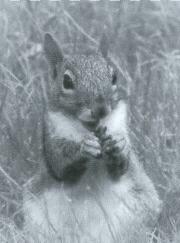|
Dodging the Bullet
Squirrel hunting has declined steadily in the last 11 years, a trend that reflects the
nationwide plummet of small game hunters. Will numbers ever bounce back?
BY BURKE SPEAKER

Jim Walker tried to make his
son a squirrel hunter. It
shouldn't have been too difficult, considering Walker's own love
of the sport. The 59-year-old Golconda native has hunted squirrels
since he was 11, when his father
introduced him to what later would
become a lifelong passion.
So when his son turned eight, he
took the boy into the Shawnee
National Forest in the hope of
instilling him with an appreciation
for squirrel hunting. Chris participated for a few years in squirrel
hunts with his dad, but soon moved
on to other things.
"He's now into fishing more
than I am, and he hunts other
game," Walker said. "But he
doesn't really get into squirrel
hunting."
Walker's situation parallels a
puzzling statewide trend. Squirrel
hunting numbers have declined
steadily in the past 11 years, showing that chasing bushy-tails is a
sport many are bypassing.
Craig Miller of the Illinois Natural History Survey documented a
rundown of squirrel hunting numbers for Illinois' two hunted squirrels—the fox and gray squirrel.
Based on statistics from an 11-year
hunter harvest survey, there is a
continuing drop in the number of
statewide hunters.
In 1988, fox squirrel hunters
totaled 121,182, but by 1998 hunter
numbers had fallen by more than
38,000. Similarly, in 1988 gray
squirrel hunters were 75,407, later
decreasing to 60,682 recorded
hunters in 1998. "There's just fewer
and fewer people out hunting squirrels," Miller said. "That's just what
we're seeing."
So where are all the squirrel
hunters going?
They're off hunting larger game,
says Paul Shelton, forest wildlife
program manager. "I think there's
now more of an emphasis on larger
species," he said. "The market has
shifted to white-tailed deer hunting
opportunities. It's certainly not the
lack of a squirrel population."
Oddly enough, it's not just squirrel
hunting that is dwindling. The U.S.
Fish and Wildlife Service reports that
small game hunting has lost steam
nationally since the mid-70s.
The ages of the squirrel hunters
were excluded from the survey,
therefore, there was no confirmation to what many older squirrel
hunters suspect-that the younger
generation is not squirrel hunting
like the previous generations did.
"We don't have the squirrel
hunters we used to," Walker said.
"A lot are older, many have died,
and I don't think the younger people get into it as they did in my day.
They're not instilled with the love
of hunting that I had from my dad
and grandfather."
Shelton agrees. "Nowadays you
tend not to see that as much. It's a
disappointment to us. It's a great
resource out there that's vastly
"underutilized. And it's also a bonding opportunity between father and
son, and that's quality time for a parent and child that's not being used."
While there's usually a cause
and effect relationship in shifting
trends, there is no sign of squirrel
populations increasing. "As far as
having a runaway population, we're
not seeing one nor do we expect
one," Shelton said.
Still, hunters like Walker say the
real damage is overlooking a quality pastime. "I still love to squirrel
hunt," he said. "When I retire in a
few years, I may squirrel hunt
every morning."
But as diversions like video
games and the Internet take time
away from a youngster's hunt time,
people like Shelton expect the trend
to continue. "Right now I can't see
anything that will change it," Shelton said.
|

